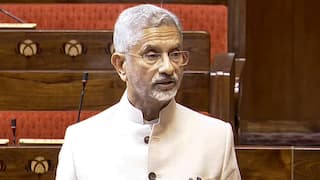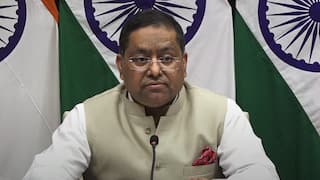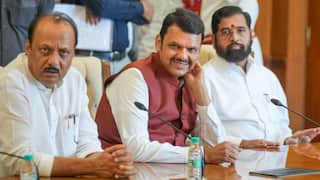Book Review | Karpoori Thakur Biography Offers Sensitive Portrayal Of Bihar Titan, Humble Roots To Controversial Death
The biography ‘The Jannayak Karpoori Thakur: Voice of the Voiceless’ by Santosh Singh and Aditya Anmol has been published in honour of the former Bihar CM’s birth centenary.

In the pantheon of Indian political leaders, Karpoori Thakur occupies a very special place in the collective memory of Bihar and beyond. The biography ‘The Jannayak Karpoori Thakur: Voice of the Voiceless’ by Santosh Singh and Aditya Anmol, published in honour of the former CM’s birth centenary, offers a fascinating exploration of the life and legacy of this enigmatic leader.
Through meticulous research and powerful narratives, the authors bring to light the remarkable journey of a man who rose from humble beginnings to become a transformative figure in Indian politics.
A Chronicle Of Resilience
Karpoori Thakur was born into a humble Nai (barber) family in the remote village of Pitaunjhia, Samastipur, on January 24, 1924. His early life was marked by the challenges of poverty and social exclusion. The economic constraints of his family could easily have resulted in a life of obscurity, but Thakur's innate brilliance and indomitable spirit propelled him on to a path of social reform and political activism. This biography sensitively illuminates his formative years and portrays a young man driven by a deep sense of justice and a desire to better his community.
Karpoori Thakur’s political journey began with his involvement in the freedom struggle, during which he was imprisoned for 26 months. This formative experience, combined with his keen intellect and oratory skills, laid the foundation for his political future. Senior journalist Santosh Singh and researcher Aditya Anmol brilliantly show how Karpoori Thakur’s early experiences with political activism shaped his vision for a more just society.
Architect Of Social Justice
The land of Bihar has been a centre for the socialist movement since ancient times – it has continuously strived to create an egalitarian society. Bihar’s history reflects its ongoing commitment to social equality in India.
Karpoori Thakur’s political career is a perfect example of his unwavering commitment to social justice. His tenure as Chief Minister of Bihar, first from 1970 to 1971 and then from 1977 to 1979, was marked by pioneering policies that sought to address the deep-rooted injustices of Indian society. One of his most revolutionary contributions was the introduction of the ‘quota within quota’ system, a policy aimed at achieving a more nuanced and equitable distribution of reservation benefits.
While Karpoori Thakur was Chief Minister, the Mungeri Lal Commission suggested that the backward classes be divided into extremely backward classes, weaker sections of Muslims, and backward classes. In 1978, Thakur’s government accepted this suggestion and created a 26% reservation for these groups in civil services. This revolutionary approach, which provided reservations for various backward classes, women and economically weaker sections, was a pioneering step in the field of affirmative action and influenced national policies.
He is known in Bihar politics for enforcing the state’s first total liquor ban in 1970. Nitish Kumar followed this with his own liquor ban in 2016. Karpoori Thakur’s efforts aimed to address the social and economic impacts of alcohol consumption, particularly among vulnerable communities. Similarly, Nitish Kumar’s decision focused on the adverse effects of alcohol on marginalised groups, especially women.
Karpoori Thakur was a proponent of Hindi language and, as the Education Minister of Bihar, removed English as a compulsory subject from the matriculation syllabus. It is alleged that the students of Bihar suffered from the resulting low level of English language education in the state.
Santosh Singh and Aditya Anmol write about it in detail:
“Returning to Bihar, Karpoori sought an audience with CM Mahamaya Prasad Sinha and took two important decisions. The first was to remove the obligation of English as a mandatory subject in the tenth board examinations. The second was to exempt farmers cultivating less than seven acres from paying rent for their land.
The bold move of eliminating English as a compulsory subject for passing matriculation startled both the government and the Opposition, sparking controversy. It was an incredibly courageous decision by any measure, with significant social implications. The ruling class and feudalists vehemently criticised the decision, branding it an assault on the education system.” (Page no. 119)
It is remarkable how Karpoori Thakur justified this.
“Being labelled as a ‘non-matric’ was considered an insult and a stain on one’s reputation. Karpoori vehemently rejected the notion that he was a product of the Macaulay system. He believed that while learning English was valuable, it was not the sole priority. Instead, he supported Dr Lohia’s perspective of elevating the importance of one’s native language, be it Hindi or any other language spoken and written in the country.” (Page no. 119)
It’s important to understand that Karpoori Thakur was not against English. He was advocating for Hindi. He was the first Chief Minister in India to set a precedent by speaking in Hindi at a National Development Council (NDC) meeting. His commitment to Hindi was evident in his speeches, which were not only erudite and eloquent but also reflected his deep understanding of the language. The book highlights these facts.
A Leader Of The People
Karpoori Thakur’s connection to the grassroots was a crucial aspect of his leadership. The biography vividly demonstrates his deep-rooted empathy and ability to connect with the common people. Despite his political stature, Thakur remained accessible and approachable, qualities that endeared him to the masses. His simplicity, combined with his unwavering commitment to the cause of social justice, made him a popular figure in Bihar.
The authors include stories and personal thoughts, showing that Thakur stayed humble even with his achievements. This simple description of Thakur’s character shows that his leadership was shaped by his life experiences and awareness of the social and economic issues of his time.
One of the most remarkable aspects of the biography is the exploration of Karpoori Thakur’s untimely death in 1988. The circumstances of his death remain controversial, and speculation of foul play persists. The biographers deal with these uncertainties with great sensitivity. They present different points of view and raise pertinent questions about the events that led to Thakur’s demise. This investigation adds an additional layer of intrigue to the narrative and highlights the unresolved questions that continue to surround Thakur’s life and death.
A Timely Reflection
‘The Jannayak Karpoori Thakur: Voice of the Voiceless’ is more than a historical account; it reflects on democratic socialism and the role of leaders in shaping society. In one of the later chapters, ‘The Trail of Camphor’, the biographers delve into Bihar’s political history and the legacy of its chief ministers like Shri Krishna Singh, Karpoori Thakur, Lalu Prasad Yadav, and Nitish Kumar. Both Lalu Prasad Yadav and Nitish Kumar have sought to carry forward Karpoori Thakur’s commitment to empowering the masses. This section is filled with anecdotes and provides comprehensive insights into Bihar’s political landscape from the Janata Party era to today. The book also encourages a broader debate about political leadership and its impact on social justice.
Through their meticulous research and balanced perspective, the biographers offer readers an opportunity to reflect on the continuing relevance of Thakur’s principles in today’s socio-political context. They precisely write about how his reservation policy, introduced in 1978, reshaped the political ground of Bihar and left a lasting mark on Indian reservation politics.
This book is essential reading for anyone interested in the structures of Indian politics, the evolution of social justice movements, fight against the primacy of the elite in education, governance politics, and the continuing impact of Karpoori Thakur's vision on building a more just society.
Book: The Jannayak Karpoori Thakur: Voice of the Voiceless by Santosh Singh, Aditya Anmol
Publisher: Penguin
Price: Rs 599
Ashutosh Kumar Thakur is a Bengaluru-based management professional, curator, and literary critic
[Disclaimer: The opinions, beliefs, and views expressed by the various authors and forum participants on this website are personal and do not reflect the opinions, beliefs, and views of ABP News Network Pvt Ltd.]
Trending News
Top Headlines





























